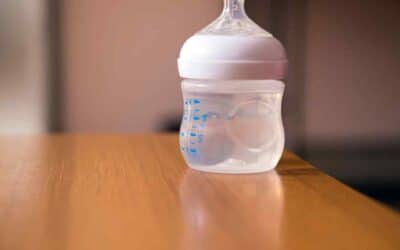Hydration, often overlooked, plays a pivotal role in the overall health and well-being of individuals across all age groups. However, when it comes to infants—a stage characterized by rapid growth and development—hydration takes on an even more paramount importance. As the brain undergoes its most crucial stages of growth during infancy, ensuring optimal hydration becomes imperative for its health and proper functioning.
This article delves into the intricate relationship between hydration and brain health in infants, shedding light on why every drop of water counts. Whether you’re a new parent, a caregiver, or just someone curious about pediatric health, understanding the significance of hydration for an infant’s developing brain can offer insights into one of the foundational aspects of early childhood care.

The Basics of Hydration
Understanding Hydration: More Than Just Drinking Water
- Definition and Importance: At its core, hydration refers to the process of absorbing, retaining, and balancing water in the body. It’s essential for maintaining optimal brain and body function.
- Dehydration – A Silent Culprit: Even mild dehydration can have profound effects on the body. Research shows that mild dehydration affects mood, cognitive function, and physical activity. Furthermore, dehydration can lead to headaches and reduced metabolic function.
- Statistics and Studies: In a study published in the br j nutr, statistical analyses found that adults, especially healthy young women, experienced mood disturbances and reduced cognition even with just a 1-2% reduction in body mass due to fluid loss.
Water: The Elixir of Life
- A Vital Nutrient: Water is an essential nutrient that aids in metabolism, nutrient transportation, and temperature regulation. Every cell, tissue, and organ relies on water to function correctly.
- Hydration Status and Cognitive Function: Numerous studies, including those in the br j nutr and medicine journals, have established a direct link between hydration status and cognitive performance. Even mild dehydration can lead to reduced cognitive function in children and young adults.
- Infants and Hydration: For infants, hydration is even more critical. While breast milk provides most of their hydration needs, as they grow, introducing fresh fruit with high water content and plain water is vital for their development.
Making the Right Choices: Water Intake and Alternatives
- Plain Water vs. Other Beverages: While other beverages can contribute to hydration, plain water remains the best choice. Research has shown that drinking water is more effective than other drinks in maintaining optimal hydration and brain function.
- Infusing Flavor: For those who find plain water bland, you can infuse water with fresh fruits or even ice cubes made from fruit juice to add flavor without compromising hydration benefits.
- High Water Content Foods: Foods like fruits and vegetables, with their high water content, can also help in staying hydrated. They offer a dual benefit of hydration and essential nutrients.
Factors Affecting Hydration Needs
- Physical Activity and Environment: People engaging in physical activity or living in hot climates have a higher water consumption need. Additionally, kids at play or in school sports need to drink more water to stay hydrated.
- Other Factors: Age, body mass, and certain medical conditions can also influence water requirements. For instance, young adults might have different hydration needs than older adults or children.
- Alzheimer’s and Dehydration: Few studies have suggested a potential link between chronic dehydration and a higher risk of Alzheimer’s disease, emphasizing the importance of consistent hydration throughout life.

Brain Development in Infants
Journey Through the Stages
- Foundational Growth: In the initial months after birth, an infant’s brain undergoes rapid growth, laying the foundation for cognitive function and behavior. The first study conducted at a renowned university revealed that during this period, the brain forms a significant number of neural connections, paving the way for future learning and memory.
- Cognitive Milestones: As the infant grows, the brain begins to show signs of cognitive performance. This is when they start to recognize faces, respond to stimuli, and even show preferences for certain toys or food. Researchers have found that this stage is essential for setting the tone for future cognitive development and school performance.
- Into Toddlerhood: Transitioning from an infant to an older child, the brain starts refining its functions. This is the period when children begin to exhibit more refined behaviors, understand complex instructions, and even exhibit mood changes based on their surroundings.
Hydration: The Unsung Hero of Brain Development
- Nurturing the Brain: Just as nutrition is vital for the body’s growth, hydration plays an equally crucial role in brain development. Drinking enough water ensures that the brain functions optimally, paving the way for better cognitive performance and memory.
- Dehydration’s Impact: Mild dehydration can have profound effects on an infant’s brain. It can lead to headaches, affect mood, and even hamper cognitive function in children. In a study conducted by leading researchers, findings showed that even a slight reduction in water intake can have significant adverse effects on an infant’s brain function.
- Essential Nutrients: Apart from plain water, breast milk in the early months provides not just hydration but also essential nutrients that fuel brain growth. As the child grows, introducing fresh fruit and other foods with high water content ensures they stay hydrated and receive the necessary nutrients for brain development.
Making the Right Choices for Brain Growth
- Water Intake and Brain Health: The correlation between water intake and cognitive function is undeniable. Researchers emphasize the importance of choosing water as the primary drink for infants and kids. Parents and caregivers should offer water regularly, ensuring that the child remains hydrated, thus supporting optimal brain function.
- Beyond Drinking: Hydration and cognitive growth don’t just come from drinking water. Foods rich in water content, like fresh fruits, play a dual role in providing hydration and essential nutrients. This combined effect leads to a positive effect on brain development.
Effects of Dehydration on Infant Brain Health
The Pervasive Impact of Dehydration
- Brain Vulnerability: An infant’s brain, being in its early stages of development, is particularly susceptible to the effects of dehydration. While adults can often compensate for mild dehydration, infants, due to their delicate metabolic balance, can quickly experience pronounced effects on cognition and behavior.
- Understanding Dehydration: Dehydration in infants doesn’t just result from not drinking enough water. Factors such as climate, physical activity, and even the food they consume play a role. While breast milk provides hydration, as infants grow and diversify their nutrition, the source of hydration starts to shift, emphasizing the importance of introducing more water into their diet.
Immediate Consequences: Short-Term Effects
- Cognitive Delays: Even brief periods of dehydration can lead to cognitive function disruptions in infants. A study showed that infants who were dehydrated had difficulty processing information and responding to stimuli compared to their hydrated counterparts.
- Mood and Behavior: Dehydration can lead to mood changes in infants. Parents might notice increased irritability, fussiness, and even altered sleep patterns. The child’s usual behavior may shift, leading to increased crying or restlessness.
- Attention Challenges: A dehydrated infant may exhibit a decreased attention span. They might lose interest in activities quicker, be less responsive to toys or interactions, and overall seem less engaged with their surroundings.
Long-Term Implications
- Developmental Concerns: Persistent dehydration during infancy can potentially lead to developmental delays. Areas such as speech, motor skills, and even social interactions might be affected.
- Cognitive Setbacks: Over time, repeated episodes of dehydration can result in decreased cognitive function. As the child progresses to school, they might face challenges in learning, memory retention, and problem-solving.
- Brain Health: Chronic dehydration can have long-term implications on overall brain health. While research is still ongoing, some studies from renowned universities suggest that consistent dehydration during infancy can lead to more significant brain health issues later in life.

Conclusion
The journey of an infant’s brain development is a marvel in itself, marked by rapid growth, neural connections, and cognitive milestones. But as we’ve explored throughout this article, the role of hydration in this journey cannot be understated. From the foundational months of birth to the transition into toddlerhood, every drop of water plays a significant part in ensuring the brain’s optimal function and development.
Dehydration, be it mild or severe, can have immediate and long-term repercussions on an infant’s cognitive function, behavior, and overall brain health. The effects of dehydration are multifaceted, ranging from short-term mood disturbances and cognitive delays to potential long-term developmental challenges and cognitive setbacks. It’s evident that staying adequately hydrated isn’t merely a matter of physical well-being; it’s intrinsically tied to the cognitive and neurological health of our youngest population.
As parents, caregivers, or simply invested individuals in pediatric health, our responsibility is clear. We must prioritize hydration, choose water as the primary source of hydration, and continually educate ourselves about the profound connection between hydration and cognitive development. By doing so, we not only support the immediate health of infants but also lay the foundation for a future marked by cognitive prowess and overall well-being. In the end, as the adage goes, “Water is life,” and nowhere is this truer than in the context of an infant’s developing brain.
Let us know if this article was helpful to you, and if you have any questions, we’ll be happy to answer them.



